- Home
- H. P. Lovecraft
The Road to Madness Page 8
The Road to Madness Read online
Page 8
Vast are the stones which sleep beneath coverlets of dank moss, and mighty were the walls from which they fell. For all time did their builders erect them, and in sooth they yet serve nobly, for beneath them the grey toad makes his habitation.
At the very bottom of the valley lies the river Than, whose waters are slimy and filled with weeds. From hidden springs it rises, and to subterranean grottoes it flows, so that the Daemon of the Valley knows not why its waters are red, nor whither they are bound.
The Genie that haunts the moonbeams spake to the Daemon of the Valley, saying, “I am old, and forget much. Tell me the deeds and aspect and name of them who built these things of Stone.” And the Daemon replied, “I am Memory, and am wise in lore of the past, but I too am old. These beings were like the waters of the river Than, not to be understood. Their deeds I recall not, for they were but of the moment. Their aspect I recall dimly, it was like to that of the little apes in the trees. Their name I recall clearly, for it rhymed with that of the river. These beings of yesterday were called Man.”
So the Genie flew back to the thin horned moon, and the Daemon looked intently at a little ape in a tree that grew in a crumbling courtyard.
The White Ship
I am Basil Elton, keeper of the North Point light that my father and grandfather kept before me. Far from the shore stands the gray lighthouse, above sunken slimy rocks that are seen when the tide is low, but unseen when the tide is high. Past that beacon for a century have swept the majestic barques of the seven seas. In the days of my grandfather there were many; in the days of my father not so many; and now there are so few that I sometimes feel strangely alone, as though I were the last man on our planet.
From far shores came those white-sailed argosies of old; from far Eastern shores where warm suns shine and sweet odors linger about strange gardens and gay temples. The old captains of the sea came often to my grandfather and told him of these things which in turn he told to my father, and my father told to me in the long autumn evenings when the wind howled eerily from the East. And I have read more of these things, and of many things besides, in the books men gave me when I was young and filled with wonder.
But more wonderful than the lore of old men and the lore of books is the secret lore of ocean. Blue, green, gray, white or black; smooth, ruffled, or mountainous; that ocean is not silent. All my days have I watched it and listened to it, and I know it well. At first it told to me only the plain little tales of calm beaches and near ports, but with the years it grew more friendly and spoke of other things; of things more strange and more distant in space and time. Sometimes at twilight the gray vapors of the horizon have parted to grant me glimpses of the ways beyond; and sometimes at night the deep waters of the sea have grown clear and phosphorescent, to grant me glimpses of the ways beneath. And these glimpses have been as often of the ways that were and the ways that might be, as of the ways that are; for ocean is more ancient than the mountains, and freighted with the memories and the dreams of Time.
Out of the South it was that the White Ship used to come when the moon was full and high in the heavens. Out of the South it would glide very smoothly and silently over the sea. And whether the sea was rough or calm, and whether the wind was friendly or adverse, it would always glide smoothly and silently, its sails distant and its long strange tiers of oars moving rhythmically. One night I espied upon the deck a man, bearded and robed, and he seemed to beckon me to embark for far unknown shores. Many times afterward I saw him under the full moon, and never did he beckon me.
Very brightly did the moon shine on the night I answered the call, and I walked out over the waters to the White Ship on a bridge of moonbeams. The man who had beckoned now spoke a welcome to me in a soft language I seemed to know well, and the hours were filled with soft songs of the oarsmen as we glided away into a mysterious South, golden with the glow of that full, mellow moon.
And when the day dawned, rosy and effulgent, I beheld the green shore of far lands, bright and beautiful, and to me unknown. Up from the sea rose lordly terraces of verdure, tree-studded, and shewing here and there the gleaming white roofs and colonnades of strange temples. As we drew nearer the green shore the bearded man told me of that land, the land of Zar, where dwell all the dreams and thoughts of beauty that come to men once and then are forgotten. And when I looked upon the terraces again I saw that what he said was true, for among the sights before me were many things I had once seen through the mists beyond the horizon and in the phosphorescent depths of ocean. There too were forms and fantasies more splendid than any I had ever known; the visions of young poets who died in want before the world could learn of what they had seen and dreamed. But we did not set foot upon the sloping meadows of Zar, for it is told that he who treads them may nevermore return to his native shore.
As the White Ship sailed silently away from the templed terraces of Zar, we beheld on the distant horizon ahead the spires of a mighty city; and the bearded man said to me, “This is Thalarion, the City of a Thousand Wonders, wherein reside all those mysteries that man has striven in vain to fathom.” And I looked again, at closer range, and saw that the city was greater than any city I had known or dreamed of before. Into the sky the spires of its temples reached, so that no man might behold their peaks; and far back beyond the horizon stretched the grim, gray walls, over which one might spy only a few roofs, weird and ominous, yet adorned with rich friezes and alluring sculptures. I yearned mightily to enter this fascinating yet repellent city, and besought the bearded man to land me at the stone pier by the huge carven gate Akariel; but he gently denied my wish, saying, “Into Thalarion, the City of a Thousand Wonders, many have passed but none returned. Therein walk only daemons and mad things that are no longer men, and the streets are white with the unburied bones of those who have looked upon the eidolon Lathi, that reigns over the city.” So the White Ship sailed on past the walls of Thalarion, and followed for many days a southward-flying bird, whose glossy plumage matched the sky out of which it had appeared.
Then came we to a pleasant coast gay with blossoms of every hue, where as far inland as we could see basked lovely groves and radiant arbors beneath a meridian sun. From bowers beyond our view came bursts of song and snatches of lyric harmony, interspersed with faint laughter so delicious that I urged the rowers onward in my eagerness to reach the scene. And the bearded man spoke no word, but watched me as we approached the lily-lined shore. Suddenly a wind blowing from over the flowery meadows and leafy woods brought a scent at which I trembled. The wind grew stronger, and the air was filled with the lethal, charnel odor of plague-stricken towns and uncovered cemeteries. And as we sailed madly away from that damnable coast the bearded man spoke at last, saying, “This is Xura, the Land of Pleasures Unattained.”
So once more the White Ship followed the bird of heaven, over warm blessed seas fanned by caressing, aromatic breezes. Day after day and night after night did we sail, and when the moon was full we would listen to soft songs of the oarsmen, sweet as on that distant night when we sailed away from my far native land. And it was by moonlight that we anchored at last in the harbor of Sona-Nyl, which is guarded by twin headlands of crystal that rise from the sea and meet in a resplendent arch. This is the Land of Fancy, and we walked to the verdant shore upon a golden bridge of moonbeams.
In the Land of Sona-Nyl there is neither time nor space, neither suffering nor death; and there I dwelt for many aeons. Green are the groves and pastures, bright and fragrant the flowers, blue and musical the streams, clear and cool the fountains, and stately and gorgeous the temples, castles, and cities of Sona-Nyl. Of that land there is no bound, for beyond each vista of beauty rises another more beautiful. Over the countryside and amidst the splendor of cities can move at will the happy folk, of whom all are gifted with unmarred grace and unalloyed happiness. For the aeons that I dwelt there I wandered blissfully through gardens where quaint pagodas peep from pleasing clumps of bushes, and where the white walks are bordered with delicate blossom
s. I climbed gentle hills from whose summits I could see entrancing panoramas of loveliness, with steepled towns nestling in verdant valleys, and with the golden domes of gigantic cities glittering on the infinitely distant horizon. And I viewed by moonlight the sparkling sea, the crystal headlands, and the placid harbor wherein lay anchored the White Ship.
It was against the full moon one night in the immemorial year of Tharp that I saw outlined the beckoning form of the celestial bird, and felt the first stirrings of unrest. Then I spoke with the bearded man, and told him of my new yearnings to depart for remote Cathuria, which no man hath seen, but which all believe to lie beyond the basalt pillars of the West. It is the Land of Hope, and in it shine the perfect ideals of all that we know elsewhere; or at least so men relate. But the bearded man said to me, “Beware of those perilous seas wherein men say Cathuria lies. In Sona-Nyl there is no pain or death, but who can tell what lies beyond the basalt pillars of the West?” Natheless at the next full moon I boarded the White Ship, and with the reluctant bearded man left the happy harbor for untraveled seas.
And the bird of heaven flew before, and led us toward the basalt pillars of the West, but this time the oarsmen sang no soft songs under the full moon. In my mind I would often picture the unknown Land of Cathuria with its splendid groves and palaces, and would wonder what new delights there awaited me. “Cathuria,” I would say to myself, “is the abode of gods and the land of unnumbered cities of gold. Its forests are of aloe and sandalwood, even as the fragrant groves of Camorin, and among the trees flutter gay birds sweet with song. On the green and flowery mountains of Cathuria stand temples of pink marble, rich with carven and painted glories, and having in their courtyards cool fountains of silver, where purr with ravishing music the scented waters that come from the grotto-born river Narg. And the cities of Cathuria are cinctured with golden walls, and their pavements also are of gold. In the gardens of these cities are strange orchids, and perfumed lakes whose beds are of coral and amber. At night the streets and the gardens are lit with gay lanthorns fashioned from the three-colored shell of the tortoise, and here resound the soft notes of the singer and the lutanist. And the houses of the cities of Cathuria are all palaces, each built over a fragrant canal bearing the waters of the sacred Narg. Of marble and porphyry are the houses, and roofed with glittering gold that reflects the rays of the sun and enhances the splendor of the cities as blissful gods view them from the distant peaks. Fairest of all is the palace of the great monarch Dorieb, whom some say to be a demi-god and others a god. High is the palace of Dorieb, and many are the turrets of marble upon its walls. In its wide halls many multitudes assemble, and here hang the trophies of the ages. And the roof is of pure gold, set upon tall pillars of ruby and azure, and having such carven figures of gods and heroes that he who looks up to those heights seems to gaze upon the living Olympus. And the floor of the palace is of glass, under which flow the cunningly lighted waters of the Narg, gay with gaudy fish not known beyond the bounds of lovely Cathuria.”
Thus would I speak to myself of Cathuria, but ever would the bearded man warn me to turn back to the happy shore of Sona-Nyl; for Sona-Nyl is known of men, while none hath ever beheld Cathuria.
And on the thirty-first day that we followed the bird, we beheld the basalt pillars of the West. Shrouded in mist they were, so that no man might peer beyond them or see their summits—which indeed some say reach even to the heavens. And the bearded man again implored me to turn back, but I heeded him not; for from the mists beyond the basalt pillars I fancied there came the notes of singers and lutanists; sweeter than the sweetest songs of Sona-Nyl, and sounding mine own praises; the praises of me, who had voyaged far from the full moon and dwelt in the Land of Fancy. So to the sound of melody the White Ship sailed into the mist betwixt the basalt pillars of the West. And when the music ceased and the mist lifted, we beheld not the Land of Cathuria, but a swift-rushing resistless sea, over which our helpless barque was borne toward some unknown goal. Soon to our ears came the distant thunder of falling waters, and to our eyes appeared on the far horizon ahead the titanic spray of a monstrous cataract, wherein the oceans of the world drop down to abysmal nothingness. Then did the bearded man say to me, with tears on his cheek, “We have rejected the beautiful Land of Sona-Nyl, which we may never behold again. The gods are greater than men, and they have conquered.” And I closed my eyes before the crash that I knew would come, shutting out the sight of the celestial bird which flapped its mocking blue wings over the brink of the torrent.
Out of that crash came darkness, and I heard the shrieking of men and of things which were not men. From the East tempestuous winds arose, and chilled me as I crouched on the slab of damp stone which had risen beneath my feet. Then as I heard another crash I opened my eyes and beheld myself upon the platform of that lighthouse whence I had sailed so many aeons ago. In the darkness below there loomed the vast blurred outlines of a vessel breaking up on the cruel rocks, and as I glanced out over the waste I saw that the light had failed for the first time since my grandfather had assumed its care.
And in the later watches of the night, when I went within the tower, I saw on the wall a calendar which still remained as when I had left it at the hour I sailed away. With the dawn I descended the tower and looked for wreckage upon the rocks, but what I found was only this: a strange dead bird whose hue was as of the azure sky, and a single shattered spar, of a whiteness greater than that of the wave-tips or of the mountain snow.
And thereafter the ocean told me its secrets no more; and though many times since has the moon shone full and high in the heavens, the White Ship from the South came never again.
Arthur Jermyn
I
Life is a hideous thing, and from the background behind what we know of it peer daemoniacal hints of truth which make it sometimes a thousandfold more hideous. Science, already oppressive with its shocking revelations, will perhaps be the ultimate exterminator of our human species—if separate species we be—for its reserve of unguessed horrors could never be borne by mortal brains if loosed upon the world. If we knew what we are, we should do as Sir Arthur Jermyn did; and Arthur Jermyn soaked himself in oil and set fire to his clothing one night. No one placed the charred fragments in an urn or set a memorial to him who had been; for certain papers and a certain boxed object were found which made men wish to forget. Some who knew him do not admit that he ever existed.
Arthur Jermyn went out on the moor and burned himself after seeing the boxed object which had come from Africa. It was this object, and not his peculiar personal appearance, which made him end his life. Many would have disliked to live if possessed of the peculiar features of Arthur Jermyn, but he had been a poet and scholar and had not minded. Learning was in his blood, for his great-grandfather, Sir Robert Jermyn, Bt., had been an anthropologist of note, whilst his great-great-great-grandfather, Sir Wade Jermyn, was one of the earliest explorers of the Congo region, and had written eruditely of its tribes, animals, and supposed antiquities. Indeed, old Sir Wade had possessed an intellectual zeal amounting almost to a mania; his bizarre conjectures on a prehistoric white Congolese civilisation earning him much ridicule when his book, Observation on the Several Parts of Africa, was published. In 1765 this fearless explorer had been placed in a madhouse at Huntingdon.
Madness was in all the Jermyns, and people were glad there were not many of them. The line put forth no branches, and Arthur was the last of it. If he had not been, one can not say what he would have done when the object came. The Jermyns never seemed to look quite right—something was amiss, though Arthur was the worst, and the old family portraits in Jermyn House showed fine faces enough before Sir Wade’s time. Certainly, the madness began with Sir Wade, whose wild stories of Africa were at once the delight and terror of his few friends. It showed in his collection of trophies and specimens, which were not such as a normal man would accumulate and preserve, and appeared strikingly in the Oriental seclusion in which he kept his wife. The latter, he had s
aid, was the daughter of a Portuguese trader whom he had met in Africa; and did not like English ways. She, with an infant son born in Africa, had accompanied him back from the second and longest of his trips, and had gone with him on the third and last, never returning. No one had ever seen her closely, not even the servants; for her disposition had been violent and singular. During her brief stay at Jermyn House she occupied a remote wing, and was waited on by her husband alone. Sir Wade was, indeed, most peculiar in his solicitude for his family; for when he returned to Africa he would permit no one to care for his young son save a loathsome black woman from Guinea. Upon coming back, after the death of Lady Jermyn, he himself assumed complete care of the boy.
But it was the talk of Sir Wade, especially when in his cups, which chiefly led his friends to deem him mad. In a rational age like the eighteenth century it was unwise for a man of learning to talk about wild sights and strange scenes under a Congo moon; of the gigantic walls and pillars of a forgotten city, crumbling and vine-grown, and of damp, silent, stone steps leading interminably down into the darkness of abysmal treasure-vaults and inconceivable catacombs. Especially was it unwise to rave of the living things that might haunt such a place; of creatures half of the jungle and half of the impiously aged city—fabulous creatures which even a Pliny might describe with scepticism; things that might have sprung up after the great apes had overrun the dying city with the walls and the pillars, the vaults and the weird carvings. Yet after he came home for the last time Sir Wade would speak of such matters with a shudderingly uncanny zest, mostly after his third glass at the Knight’s Head; boasting of what he had found in the jungle and of how he had dwelt among terrible ruins known only to him. And finally he had spoken of the living things in such a manner that he was taken to the madhouse. He had shown little regret when shut into the barred room at Huntingdon, for his mind moved curiously. Ever since his son had commenced to grow out of infancy, he had liked his home less and less, till at last he had seemed to dread it. The Knight’s Head had been his headquarters, and when he was confined he expressed some vague gratitude as if for protection. Three years later he died.

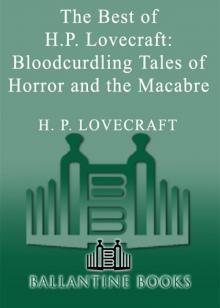 The Best of H.P. Lovecraft
The Best of H.P. Lovecraft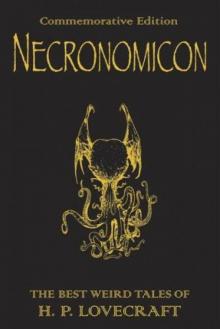 The Definitive H.P. Lovecraft: 67 Tales Of Horror In One Volume
The Definitive H.P. Lovecraft: 67 Tales Of Horror In One Volume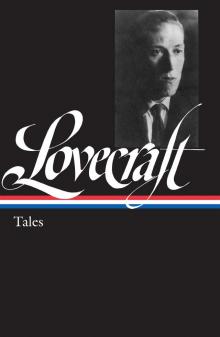 The Complete Works of H.P. Lovecraft
The Complete Works of H.P. Lovecraft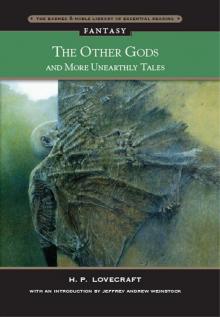 Other Gods and More Unearthly Tales
Other Gods and More Unearthly Tales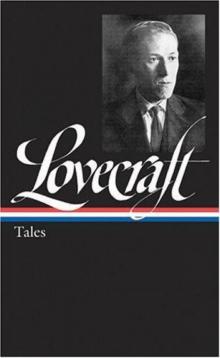 Lovecraft's Fiction Volume I, 1905-1925
Lovecraft's Fiction Volume I, 1905-1925 The Shadow Out of Time
The Shadow Out of Time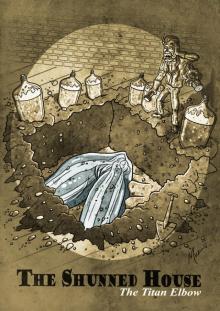 The Shunned House
The Shunned House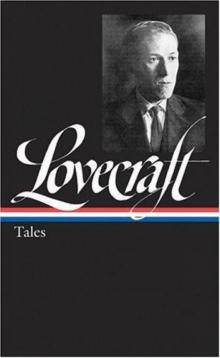 Lovecraft's Fiction Volume II, 1926-1928
Lovecraft's Fiction Volume II, 1926-1928 The Thing on the Doorstep and Other Weird Stories
The Thing on the Doorstep and Other Weird Stories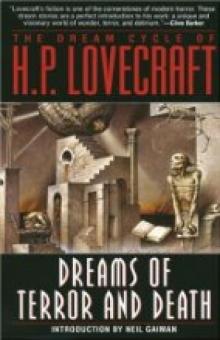 Dream Cycle of H. P. Lovecraft: Dreams of Terror and Death
Dream Cycle of H. P. Lovecraft: Dreams of Terror and Death Great Tales of Horror
Great Tales of Horror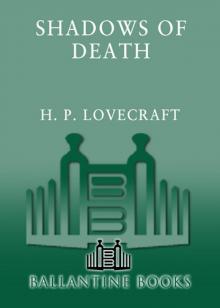 Shadows of Death
Shadows of Death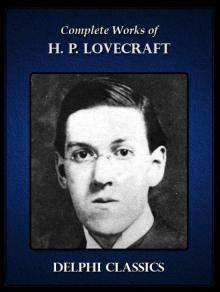 Delphi Complete Works of H. P. Lovecraft (Illustrated)
Delphi Complete Works of H. P. Lovecraft (Illustrated) Waking Up Screaming: Haunting Tales of Terror
Waking Up Screaming: Haunting Tales of Terror H.P. Lovecraft Goes to the Movies
H.P. Lovecraft Goes to the Movies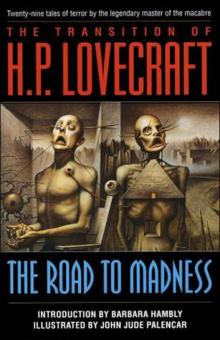 The Road to Madness
The Road to Madness The Complete H.P. Lovecraft Reader (68 Stories)
The Complete H.P. Lovecraft Reader (68 Stories)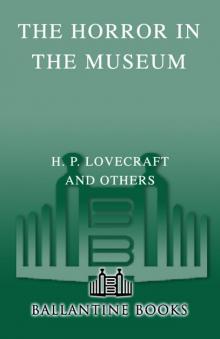 The Horror in the Museum
The Horror in the Museum Collected Fiction Volume 1 (1905-1925): A Variorum Edition
Collected Fiction Volume 1 (1905-1925): A Variorum Edition Lovecrafts_Fiction, vol.I_1905-1925
Lovecrafts_Fiction, vol.I_1905-1925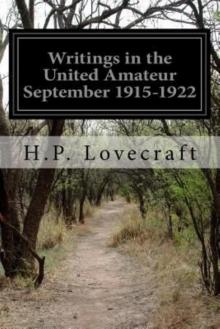 Writings in the United Amateur, 1915-1922
Writings in the United Amateur, 1915-1922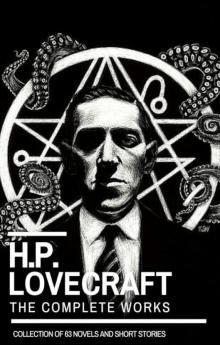 H.P. Lovecraft: The Complete Works
H.P. Lovecraft: The Complete Works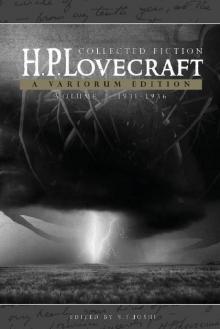 Collected Fiction Volume 3 (1931-1936): A Variorum Edition
Collected Fiction Volume 3 (1931-1936): A Variorum Edition H.P. Lovecraft: The Complete Fiction
H.P. Lovecraft: The Complete Fiction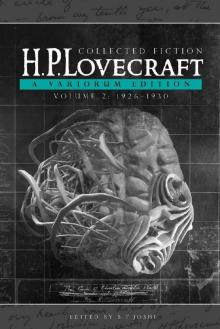 Collected Fiction Volume 2 (1926-1930): A Variorum Edition
Collected Fiction Volume 2 (1926-1930): A Variorum Edition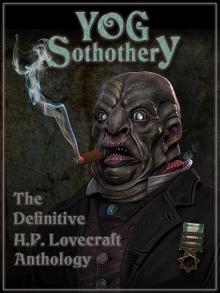 Yog Sothothery - The Definitive H.P. Lovecraft Anthology
Yog Sothothery - The Definitive H.P. Lovecraft Anthology The Complete H.P. Lovecraft Collection (Xist Classics)
The Complete H.P. Lovecraft Collection (Xist Classics)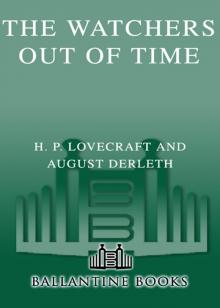 The Watchers Out of Time
The Watchers Out of Time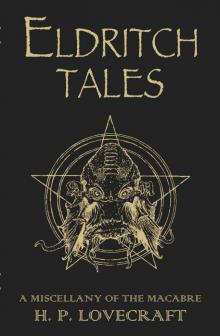 Eldritch Tales
Eldritch Tales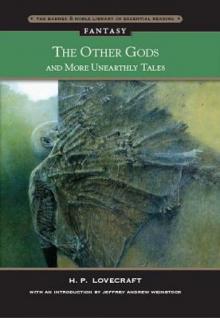 The Other Gods And More Unearthly Tales
The Other Gods And More Unearthly Tales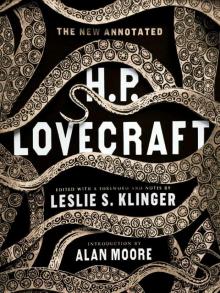 The New Annotated H. P. Lovecraft
The New Annotated H. P. Lovecraft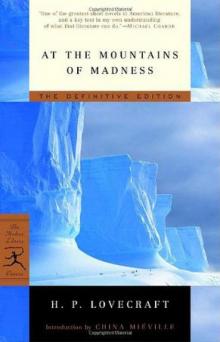 At the mountains of madness
At the mountains of madness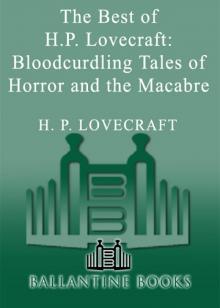 Bloodcurdling Tales of Horror and the Macabre
Bloodcurdling Tales of Horror and the Macabre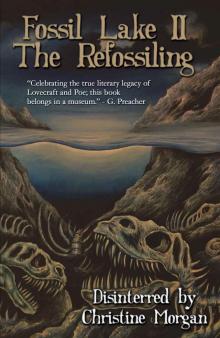 Fossil Lake II: The Refossiling
Fossil Lake II: The Refossiling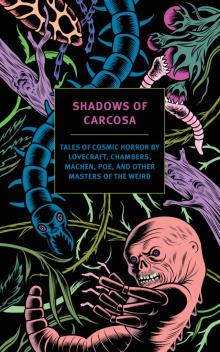 Shadows of Carcosa: Tales of Cosmic Horror by Lovecraft, Chambers, Machen, Poe, and Other Masters of the Weird
Shadows of Carcosa: Tales of Cosmic Horror by Lovecraft, Chambers, Machen, Poe, and Other Masters of the Weird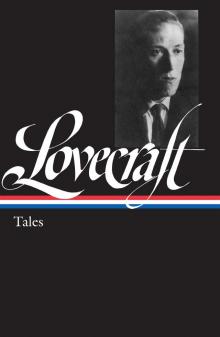 H. P. Lovecraft
H. P. Lovecraft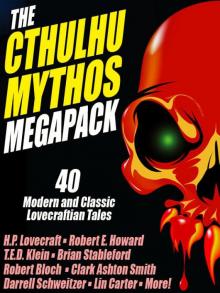 The Cthulhu Mythos Megapack
The Cthulhu Mythos Megapack The Complete H. P. Lovecraft Reader (2nd Edition)
The Complete H. P. Lovecraft Reader (2nd Edition) The Complete Fiction
The Complete Fiction Waking Up Screaming
Waking Up Screaming Transition of H. P. Lovecraft
Transition of H. P. Lovecraft![[1935] The Shadow Out of Time Read online](http://i1.bookreadfree.com/i2/04/12/1935_the_shadow_out_of_time_preview.jpg) [1935] The Shadow Out of Time
[1935] The Shadow Out of Time The Horror Megapack
The Horror Megapack